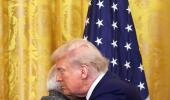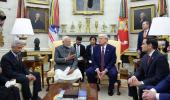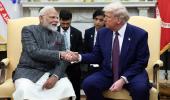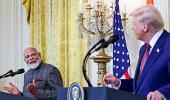'Trump administration wanted a positive tone at this summit, but there was still some anxiety that there could be some awkward moments -- and there were not.'

"Personal rapport is important in an era when personal diplomacy counts a lot in international relations. Not to mention, the US and India must navigate new minefields like tariffs and immigration," says Dr Michael Kugelman, Director, South Asia Institute, The Wilson Center, a Washington, DC-based think-tank.
"For the relationship to be able to fall back on the warm Trump-Modi partnership -- this won't be the silver bullet that gets the relationship through tough times, but it will be a stabilising force for bilateral ties," Dr Kugelman tells Rediff.com's Archana Masih.
President Trump said Prime Minister Modi 'has been a great friend of mine for years' and he has a wonderful relationship with him.
In view of this personal regard between the two leaders what are the key takeaways from the Trump-Modi meeting?
A major objective of this summit was for the two leaders to reassert their friendship. They've known each other since 2017, when Modi came to Washington and met Trump for the first time. They subsequently cultivated a special chemistry, bolstered by their shared world views and positions on various policy issues.
They hadn't seen each other since Trump's India visit in 2020. Based on the praise they lavished on each other and the warm body language on display during the summit, it seems their reconnect went swimmingly.
This personal rapport is important in an era when personal diplomacy counts a lot in international relations. Not to mention, the US and India must navigate new minefields like tariffs and immigration.
For the relationship to be able to fall back on the warm Trump-Modi partnership -- this won't be the silver bullet that gets the relationship through tough times, but it will be a stabilising force for bilateral ties.
What have been the big positives for India? Would you deem this visit a success considering the high stakes that were involved, especially about tariffs and trade?
It's hard to categorise it as anything other than a success. First, consider that Modi was just the fourth world leader to visit Trump since he returned to office.
The other three are all top allies of the US. And yet Modi got more access, getting meetings with Trump and some of his top aides and confidants. This says something about the Trump administration's high regard for Modi and its relationship with New Delhi.
Second, the two sides got a lot done. The joint statement is chock-full of announcements of new initiatives, across a variety of areas, chief among them a new US-India Compact that seems to be a new framework for partnership that emphasises cooperation in trade, tech, and defence -- long key spaces for collaborations, but since Trump took office they've also been viewed as potential areas of tension.
This signals that the Trump administration is keen to work around possible tension points on issues like tariffs and export controls.
The joint statement is all the more impressive given that the Trump administration has been in office less than a month, and top India-focused posts remain vacant.
Third, for all the talk of Trump pressure and demands related to tariffs, immigration, and 'buying American,' there was none of this at the summit.
This can be attributed to the Modi government preemptively signaling its willingness to make concessions on these issues -- but perhaps also to the importance that the administration places in its relationship with India.
Surely, the Trump administration wanted a positive tone at this summit, but there was still some anxiety that there could be some awkward moments -- and there were not.
The only bad news for India was Trump's reciprocal tariff policy, which he announced just before his meeting with Modi. But this is something that impacts many countries, not just India.

Mr Trump called Mr Modi a tough negotiator, but has made it clear that he will ensure 'reciprocity', 'charge what India charges' and reduce the trade deficit.
What do you think will the major trade deal expected by the end of the year hold for India?
There's a lack of clarity as to what exactly this trade deal is about, though the joint statement suggests the goal is to promote more trade and reduce trade barriers, both tariff and non-tariff ones.
That sounds great in principle. But it'll be a tough negotiation, given that both governments will have some protectionist interests to guard.
Fortunately, expectations are relatively modest, given that the autumn of 2025 has been set as the date to finalise just the first part of the deal.
India already imports a lot from the US, and one of the products Trump wants it to import the most -- oil -- has been the top Indian import from the US (in terms of value) for several years.
That said, the Trump administration will likely want India to diversify its import mix from the US, to further chip into what is a large ($50 billion) deficit in India's favour.
At the same time, India will naturally want quid pro quos, and that could entail pushing for American investors to deploy more capital in India's nuclear energy sector -- something New Delhi is keen to build out, having announced a new nuclear energy mission and planning to relax liability laws.
Since Mr Trump believes in a 'give and take' relationship, will an improved economic relationship ensure a sound defence/security relationship for India?
Indeed, 'give and take' is code for transactional -- a word that often carries a negative connotation when contrasted with strategic partnerships like the US-India one.
But in fact transactionalism can boost ties, including the US-India relationship. The biggest example is the trade deal the two intend to start negotiating this year.
If they can get to "yes," so to speak, then they could eventually produce a trade accord that results in each side lowering tariffs -- something that could enable the commercial relationship, already quite dynamic, to capitalise on even more of its potential.

Two points in the meeting - 1. Modi clarifying that India was not neutral on the Russia-Ukraine war and was on the side of peace. 2. Trump saying that India-US have reached an agreement that will make US a leading supplier of oil and gas to India.
What fallout is this likely to have on India-Russia relations that have stood the test of time?
I wouldn't overstate the impact of these issues on India-Russia relations. Modi has been saying for several years that he's on the side of peace -- "it's not an era of war" has become one of his signature diplomatic lines -- and this clearly hasn't disturbed its ties with Moscow.
Similar, before the war in Ukraine, in 2021, more US oil went to India than to any other country. And again, at that time, there was no deleterious impact on India-Russia relations.
There are also some caveats to make. While Modi supports peace in Ukraine, Modi, unlike Trump, is unlikely to put direct pressure on Putin to stop fighting and talk to Ukraine. That's not something India would do with its close Russian friend.
Additionally, while India is committed to buying more American oil and gas, in reality, it's not going to scale up those imports in a big way unless they're at a favourable price point.

Given how cheap Russian oil is, the US may be hard-pressed to come up with a better offer. This suggests, at least initially, while global oil markets remain what they are, that Indian increases of American oil and gas will be relatively modest.
Also, at the end of the day, Russia needs India. It may not be globally isolated, but it's facing significant levels of stress because of the war. It can't afford for its relationship with one of its closest partners, which happens to be an emerging power with one of the world's fastest growing economies and a top energy importer, to go south.
- Part 2 of the Interview: 'Easing US-China Tension May Benefit India'
Feature Presentation: Aslam Hunani/Rediff.com










 © 2025
© 2025